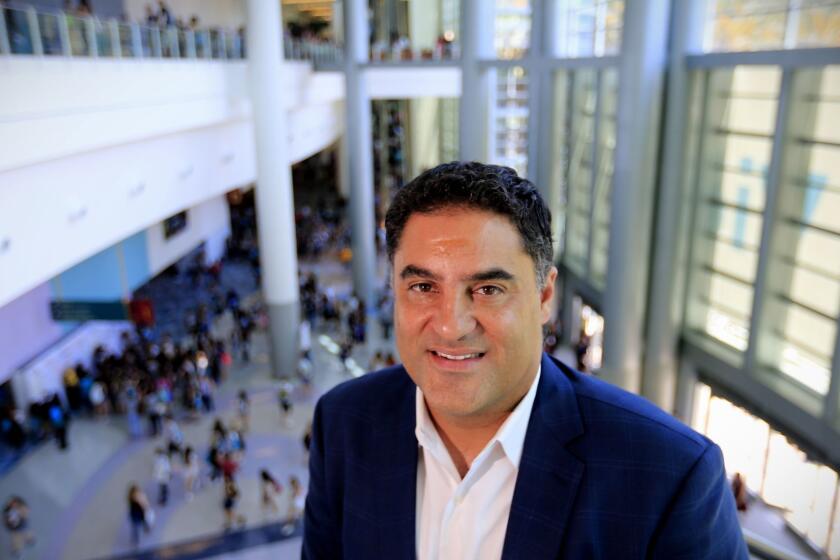No #Bernieblackout here: Sanders rides a surge of alternative media
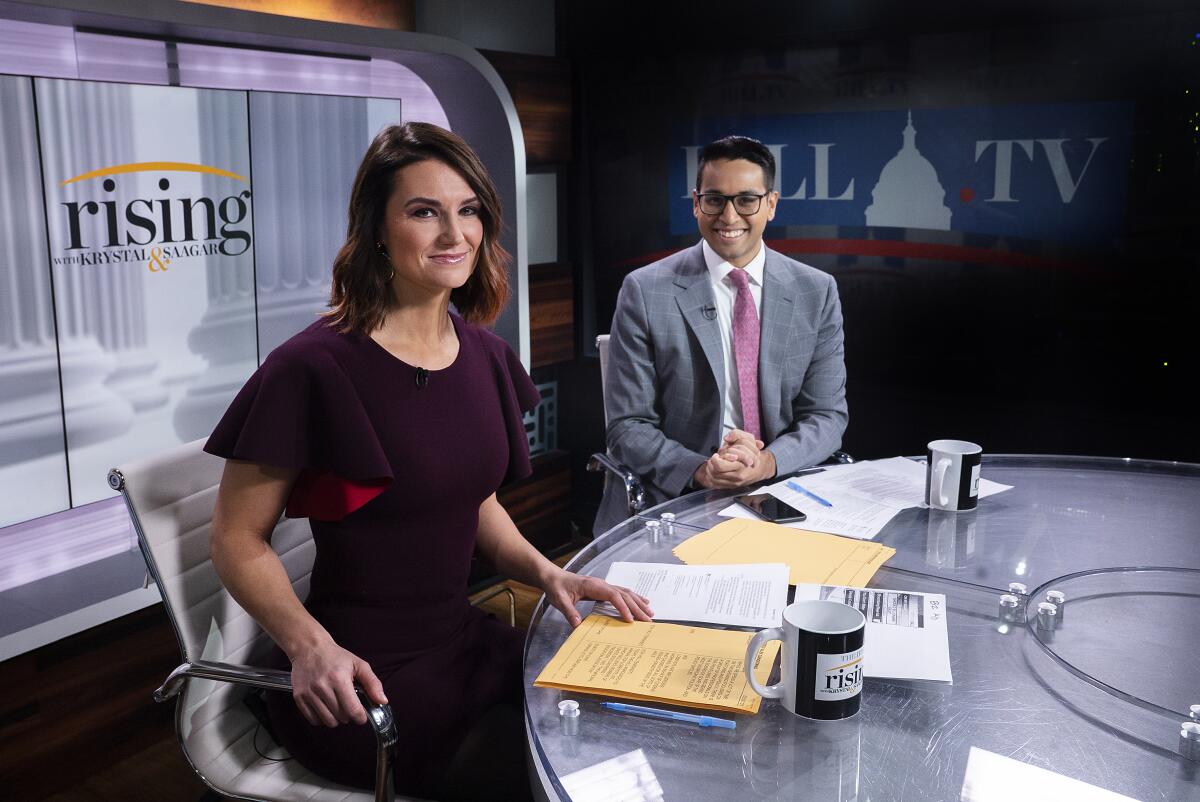
IOWA FALLS, Iowa — When Krystal Ball goes live weekday mornings, a polished format and sleek visuals give her show a look that — at first glance — closely resembles the show she once co-hosted on MSNBC.
The resemblance fades the moment the cameras start rolling on “Rising,” the viral online program co-hosted by Ball, a Democratic politico with little love for establishment Democrats.
The populist hosts and their guests mercilessly rip into several of the top Democrats in the presidential race and the media covering them, especially MSNBC.
On one recent show, the “Rising” crew mocked Joe Biden as a corrupt dinosaur amid his “No Malarkey” bus tour through Iowa. They snickered as John Kerry fell flat with an Iowa crowd after attempting to build a campaign joke around “Gone With the Wind.”
The show’s stars find South Bend, Ind., Mayor Pete Buttigieg particularly objectionable.
“Watch Pete tell a voter straight up he’s not going to stop with these shady, big-money politics,” Ball said in one segment.
One top-tier candidate typically gets spared. “Rising” adores Sen. Bernie Sanders. Affinity for the Vermont democratic socialist has helped the show rocket to an average of 600,000 viewers daily since launching last year.
That audience is not found only in the coastal enclaves of the Democratic left. In distant corners of Iowa as on urban college campuses in California, people attending Sanders’ events consistently talk about the content of shows like “Rising” and other parts of the growing alternative media world on the left.
Sanders supporters loudly protest what they see as the major media’s failure to cover their favored candidate or to portray him as a serious contender for the nomination. The hashtag #Bernieblackout has become a major presence on social media.
But coverage in what Sanders likes to disparage as the “corporate media” may matter less to him than to any of his rivals because of the benefit he derives from a surging alternative media ecosystem.
There has been an explosion in appetite for shows like “Rising” and “The Young Turks,” the relatively unstructured Los Angeles-based online production that is fervently pro-Bernie and is the flagship of the TYT network, which boasts 50 million unique views monthly.
“The mainstream media was shocked at how Bernie came out of nowhere,” said Jeff Cohen, a retired journalism professor at Ithaca College and founder of the watchdog group Fairness and Accuracy in Reporting.
“They weren’t paying attention to the fact that he first started rising because of the issues the progressive media had been talking about day after day, and doing it to ever-growing audiences. When he came along, there was finally a candidate talking about those same issues. The outlets gravitated to him.”
Not since the Vietnam War, Cohen asserts, has an expressly leftist segment of the media been so influential in America. Disaffection with establishment politics has combined with the reach of social media to create rapid audience growth.
“The rise of independent media has played a huge role in Bernie’s success,” Cohen said. “And he is a part of the reason these outlets keep getting bigger.”
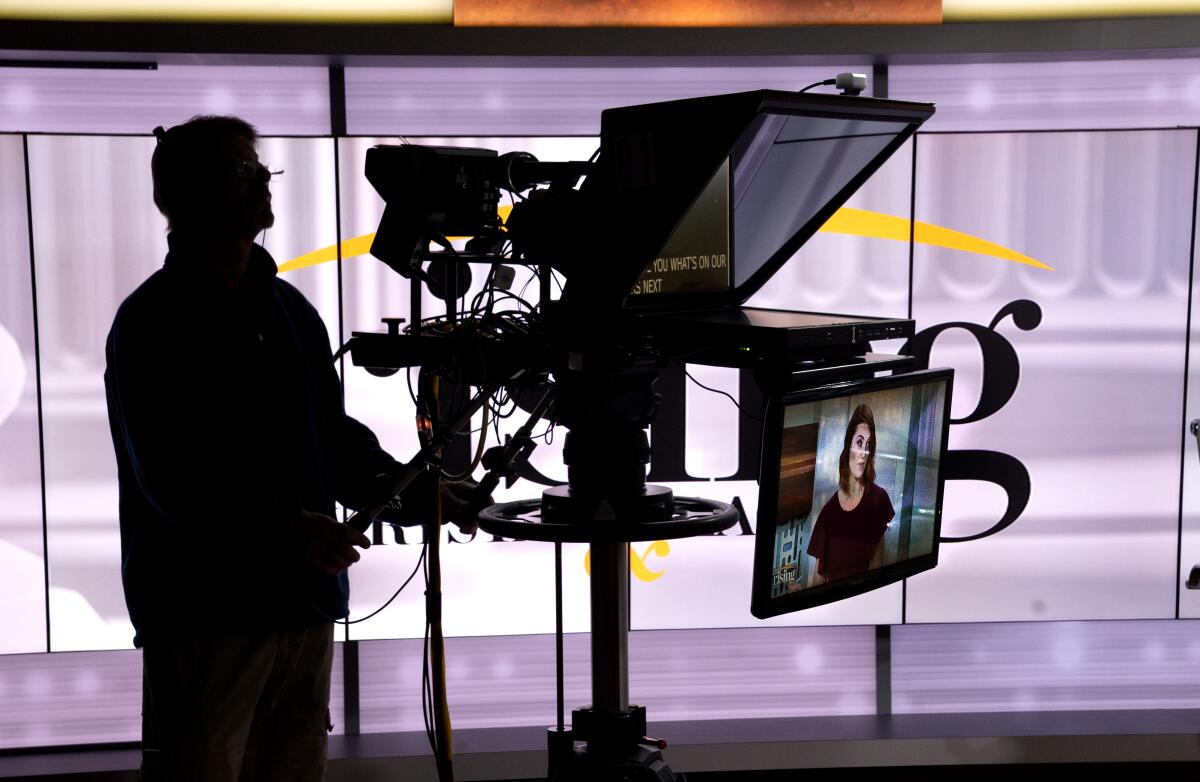
The alternative media outlets of the left don’t show the same enthusiasm for Massachusetts Sen. Elizabeth Warren, although she is an ideological ally of Sanders. Some attack her for failing to embrace a socialist label, taking a more cautious approach to government-run healthcare or for having too many links to the party establishment.
This new generation of progressive media includes widely read outlets such as the Intercept and Common Dreams, as well as niche online programs like “The Michael Brooks Show,” and Jacobin, the magazine of choice for young socialists.
Sanders supporters find both community and validation in those outlets.
“The corporate media is such a hollow vessel of spin in an ideology that is totally incoherent to my belief systems,” said Timothy Amundson, a 32-year-old Sanders volunteer from the small town of Osage, Iowa, as he waited for Sanders to take the stage at a rural-issues town hall.
“It is consistently stuff I don’t care about and doesn’t click with me. So I found independent media sources that fit my worldview. It’s always kind of like, ‘wow, that’s what I have been thinking all along.’”
Amundson has bounced from the “Jimmy Dore Show” to the “Chapo Trap House” podcast to “The Majority Report,” progressive programs of varied style and substance but generally united in their affection for Sanders and disdain for establishment Democratic politics.
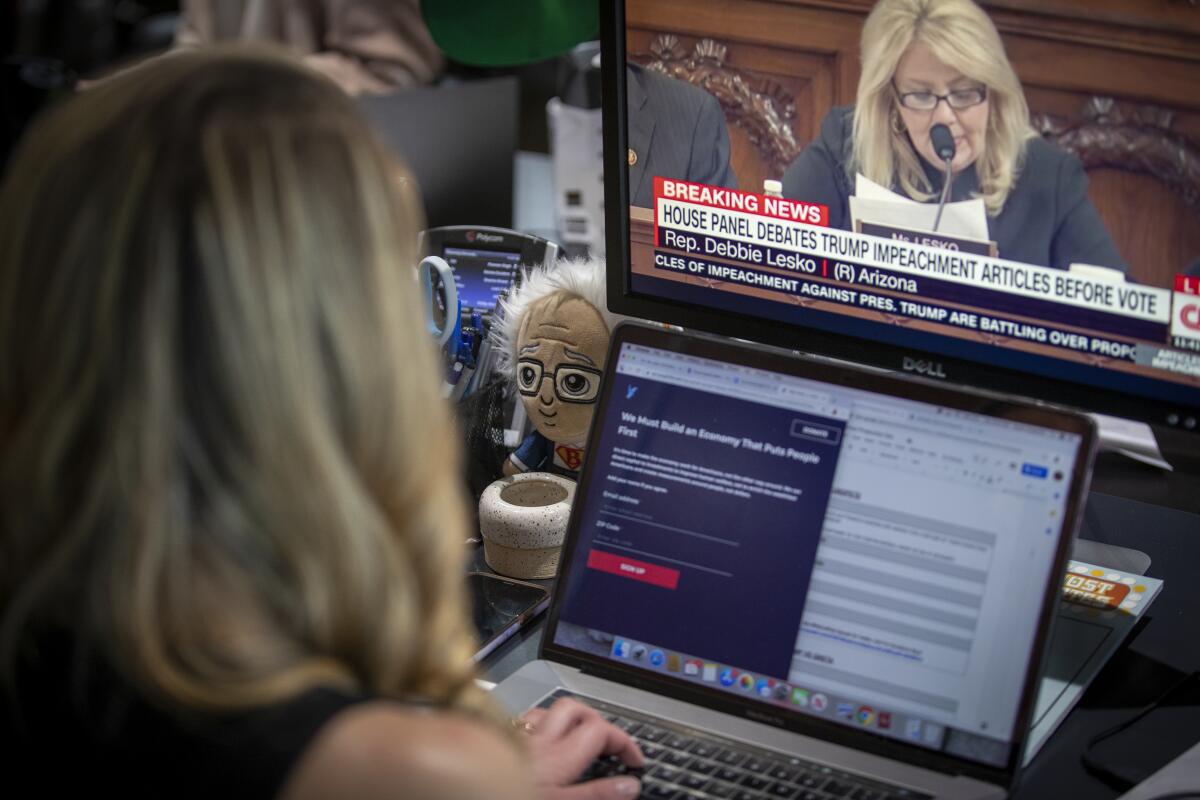
As Sanders devotees forsake mainstream media for these outlets, his campaign aides remain keenly aware that alternative media also can help his effort by nurturing story lines that eventually seep into the traditional press and reach a wider swath of voters.
“This media helps Sanders build his base, but it is niche media,” said Dave Karpf, a political scientist at George Washington University who focuses on grassroots movements.
“You can’t expand to a broader electorate with just niche media. You need that mainstream media that is currently counting him out or under-covering him.”
For now, however, the alternative media plays a key role in cementing Sanders’ base of supporters.
Across the aisle from Amundson at the rural-issues event was Heather Gordon, a 35-year-old state health inspector living in Iowa Falls, who has found her way to “The Young Turks.”
“It really speaks to the quietly independent folks who are out here and don’t make a lot of noise, but we care about all these issues Bernie is focused on,” she said. “It gives you access to what he is talking about and some of the arguments for it.”
The progressive news sources are dwarfed in size and reach by outlets on the right including Fox News and, in its heyday, Breitbart, which had amassed 17 million readers by the time President Trump took office, before its readership plunged more recently.
But the influence of alternative media on the Democratic primary is formidable. And the Sanders campaign has used its considerable resources to strengthen them further, helping to amplify the reach of these programs over social media, align with them on their various crusades — often against the mainstream press — and provide content.
The campaign has many ties to the alternative media. National press secretary Briahna Joy Gray was the political editor at the Intercept. Senior advisor David Sirota was a “Young Turks” contributor. And deputy campaign manager Ari Rabin Havt is a progressive media critic.
Sanders himself has been harnessing alternative media as a tool since his days as the first socialist mayor of Burlington, Vt., when he consolidated voter support through his community access TV show, “Bernie Speaks With the Community.”
Community broadcasting remains a pillar of the Sanders coalition, particularly radio stations that carry “Democracy Now!,” a longtime favorite on the left.
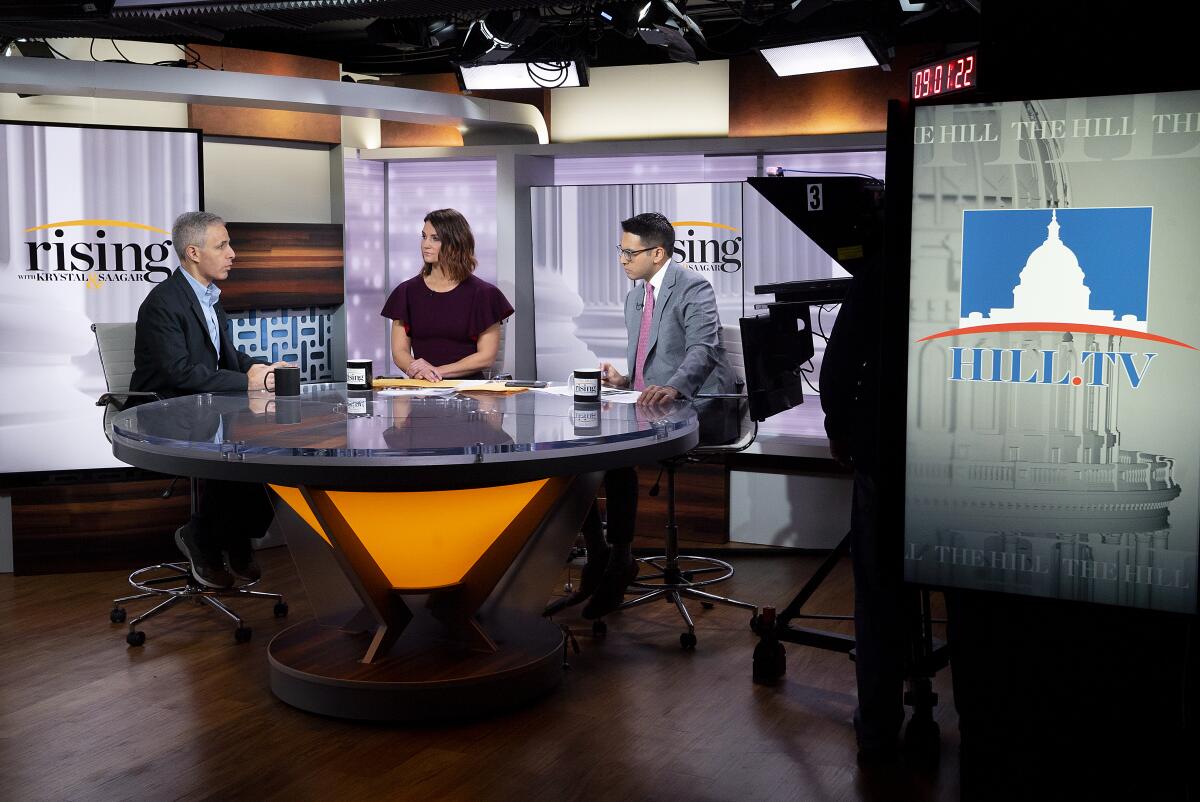
Among the reporters in the press section of a small organic-farming forum featuring Sanders in Story City, Iowa, last week was Margot McMillen, host of “Farm and Fiddle” on KOPN-FM (89.5), a community-run progressive radio station in Columbia, Mo. She drove all day to be there.
“I left at 8:30 this morning and got here at 5,” McMillen said. “I’m hoping to just play a tape on my show and comment on it.”
Such shoestring productions have always fueled the left, but the current campaign has seen the emergence of glossier progressive shows.
“Our fans love that it looks like ‘The Today Show’ or ‘Morning Joe,’” Ball said of “Rising.”
“It has that chirpy morning music. But what we are talking about is very different. It lends mainstream credibility to a view skeptical of power that has a fundamentally anti-establishment lens.”

At “The Young Turks,” the hosts purposely put less shine on their production. No scripts, no teleprompters. Everything is off the cuff. The banter is not always focused, but the audience keeps growing.
“People are hungry for individuals who can be vulnerable with the audience and show who they are as a person,” said Ana Kasparian, 33, who hosts “The Young Turks” along with creator Cenk Uygur, a 49-year-old now on hiatus as he runs for the Los Angeles-area congressional seat vacated when Rep. Katie Hill resigned recently. Sanders endorsed Uygur on Thursday then revoked the endorsement Friday amid controversy about some of Uygur’s past statements.
Cenk Uygur of ‘The Young Turks’ online talk show had won Sanders’ endorsement despite offending women, Jews, Muslims and others.
“Traditional news is very robotic,” she said. “It doesn’t appeal to younger generations.”
“Young Turks’ ” TYT network was among the first to promote Sanders, back when he was mulling his 2016 run.
The Sanders campaign and “The Young Turks” fed off each other. As the fledgling network paid him more attention, its audience grew. Eventually, Uygur was standing side by side with Sanders at his events.
“Everyone was dismissive of Bernie Sanders then,” said Kasparian. “No one was covering Sanders at the time, but there was this market for coverage of him.”

More to Read
Get the L.A. Times Politics newsletter
Deeply reported insights into legislation, politics and policy from Sacramento, Washington and beyond. In your inbox three times per week.
You may occasionally receive promotional content from the Los Angeles Times.
